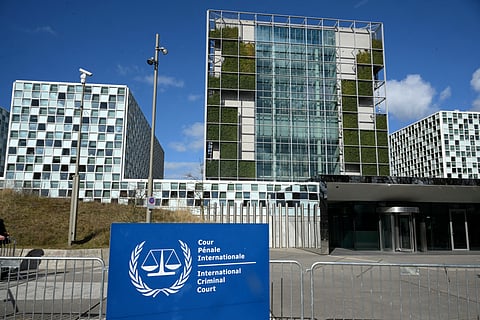U.S. mulls sweeping sanctions vs ICC
The United States is preparing to impose sweeping sanctions on the International Criminal Court (ICC), a move that could cripple the tribunal’s operations just as it pursues high-profile cases — including that against former Philippine President Rodrigo Duterte.
According to an exclusive Reuters report citing six sources, the US State Department is finalizing “entity-wide sanctions” that would go beyond earlier measures targeting individual ICC officials. The sanctions could freeze assets, block access to banking and software systems, and disrupt salary payments.
Anticipating the move, the ICC has prepaid staff wages through the rest of 2025 and is seeking alternative service providers.
The push comes after the ICC issued arrest warrants for Israeli Prime Minister Benjamin Netanyahu, former Defense Minister Yoav Gallant, and Hamas leader Ibrahim al-Masri for alleged war crimes in Gaza.
Washington argues the court has no jurisdiction over Israel and the US, since neither is a member state. The ICC, however, recognizes Palestine, which gives it standing to investigate crimes in its territory.
Previous sanctions
In August 2025, the Trump administration invoked Executive Order 14203 to sanction four ICC officials: Trial Division Judges Kimberly Prost and Nicolas Yann Guillou, and Deputy Prosecutors Nazhat Shameem Khan and Mame Mandiaye Niang.
The measures froze their US-based assets, barred transactions with American entities, and extended to any companies they controlled.
The ICC denounced the move as “a flagrant attack against the independence of an impartial judicial institution,” calling on member states to stand firm in support of international justice.
Duterte angle
The sanctions debate has caught attention in the Philippines, as Duterte remains detained in The Hague on three counts of crimes against humanity tied to thousands of killings during his years as Davao City mayor and later as president.
The Return FPRRD Movement on Tuesday said the US sanctions could extend to Duterte’s case. Convenor Benito Ranque said Executive Order 14203 protects “allies” of the US and Israel, and could cover the former president.
“The reported US sanctions on the ICC are a welcome development for US allies, including Tatay Digong, who is now detained in The Hague,” Ranque told DAILY TRIBUNE.
The group claimed that individuals and organizations that helped facilitate Duterte’s detention could be targeted under US rules which block the property and interests of sanctioned persons within US jurisdiction and bar dealings with them by American citizens and companies.
Despite the mounting pressure, the ICC vowed to continue its work. “The Court will fulfill its mandate, undeterred, in strict accordance with its legal framework… in the sole interest of the victims of international crimes,” it said.
Decisions on the US sanctions are expected in the coming weeks.


